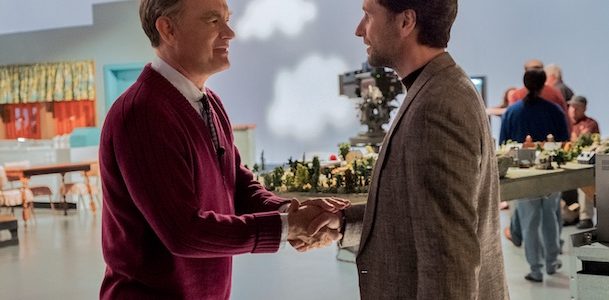
ReelBob: ‘A Beautiful Day in the Neighborhood’ ★★★★
By Bob Bloom
Sometimes the approach to a movie and the way it is constructed help elevate its emotional core and an audience’s response.
Such is the case with “A Beautiful Day in the Neighborhood,” director Marielle Heller’s tender drama that stars Tom Hanks as Fred Rogers, the iconic host of the children’s show, “Mister Rogers Neighborhood.”
The movie, adapted from an “Esquire” magazine story by Tom Junod and inspired by the friendship that developed between Rogers and Junod, is a five-hankie tearjerker that mostly speaks softly, but carries a big message.
Smartly, the movie is not a Rogers biopic. Rather, it focuses on the impact that Rogers has on others through his selflessness, innate goodness and acute understanding of people.
The wisest decision Heller made — and probably in consultation with Hanks — was that the actor not perform an imitation of Rogers, but simply act his essence.
And it works perfectly. Hanks uses his eyes to probe those he talks to — as if trying to pinpoint their inner pain. Rogers wants to help without being too intrusive, to soothe what ails them.
The movie is done with the upmost sincerity, and, wisely, does not canonize Rogers. Nor does it mock his philosophical belief that all children are good and will grow up to be wise, strong and moral adults if treated with kindness — and, most importantly, if parents remember the child that is still living within themselves.
Heller’s surrogate for cynicism is the Junod character, renamed Lloyd Vogel and played by Matthew Rhys, with an anger that masks a deep pain.
Vogel is an investigative reporter who writes articles that have aggravated many subjects and who has basically made himself such a pariah that people decline interviews with him.
His editor, played by Christine Lathi, assigns him to write a 400-word piece on Rogers for the issue that the magazine is doing on heroes.
Vogel is shocked she chose him and, at first, refuses the assignment. But his editor insists, and Vogel sets up an interview with Rogers.
Heller films their first meeting from Vogel’s perspective. When he enters the Pittsburgh studio where “Mr. Rogers Neighborhood” is aired, he looks taken aback, as if he has landed on an alien planet.
Heller films their initial encounter as a face-off, with each sizing the other up — Vogel, armed with his skepticism and Rogers with his open humanity. Vogel does not know how to react; he is skeptical, believing Rogers is putting on an act.
Slowly, he comes to realize that Rogers’ gentleness and concern are genuine. And, bit by bit, Vogel begins to open up to Rogers about his sorrow.
Vogel is estranged from his father and, without being pushy, Rogers guides him to the realization that reconciling with his father will help free him of the rage he holds within.
Heller has composed “A Beautiful Day in the Neighborhood” like one of the lessons Rogers would discuss on his program. That is evident from the opening shot. And, Heller maintains that theme until the finale.
The tact Heller takes, putting the movie’s emphasis on Vogel and not Rogers, works perfectly. The movie is a tribute to the influence Rogers softly wielded over children and adults alike.
Rogers is not painted as a saint and, as he tells Vogel, he doesn’t consider himself a hero. He admits to making mistakes as a person and a parent.
Heller makes “A Beautiful Day in the Neighborhood” an intimate movie. When Rogers talks with people, he leans into them, looking directly at them. It’s like he’s a human scalpel looking for that interior boil to lance, removing the festering that covers the soul.
She also combines a series of long pauses and close-ups during the interviews between Rogers and Vogel, focusing on the latter’s reactions to the questions Rogers either answers, deflects or turns back on the journalist.
“A Beautiful Day in the Neighborhood” is a movie for families — especially those that are having issues. It is so tender, vulnerable and passionately honest that it should — or will — be a first step on the road to reconciliation and forgiveness.
That was the quiet superpower of Fred Rogers — and it also is the extraordinary strength of this emotionally-charged feature.
I am a founding member of the Indiana Film Journalists Association. My reviews appear at ReelBob (reelbob.com) and Rottentomatoes (www.rottentomatoes.com). I also review Blu-rays and DVDs. I can be reached by email at bobbloomjc@gmail.com or on Twitter @ReelBobBloom. Links to my reviews can be found on Facebook, Twitter and LinkedIn.
A BEAUTIFUL DAY IN THE NEIGHBORHOOD
4 stars out of 4
Not rated
